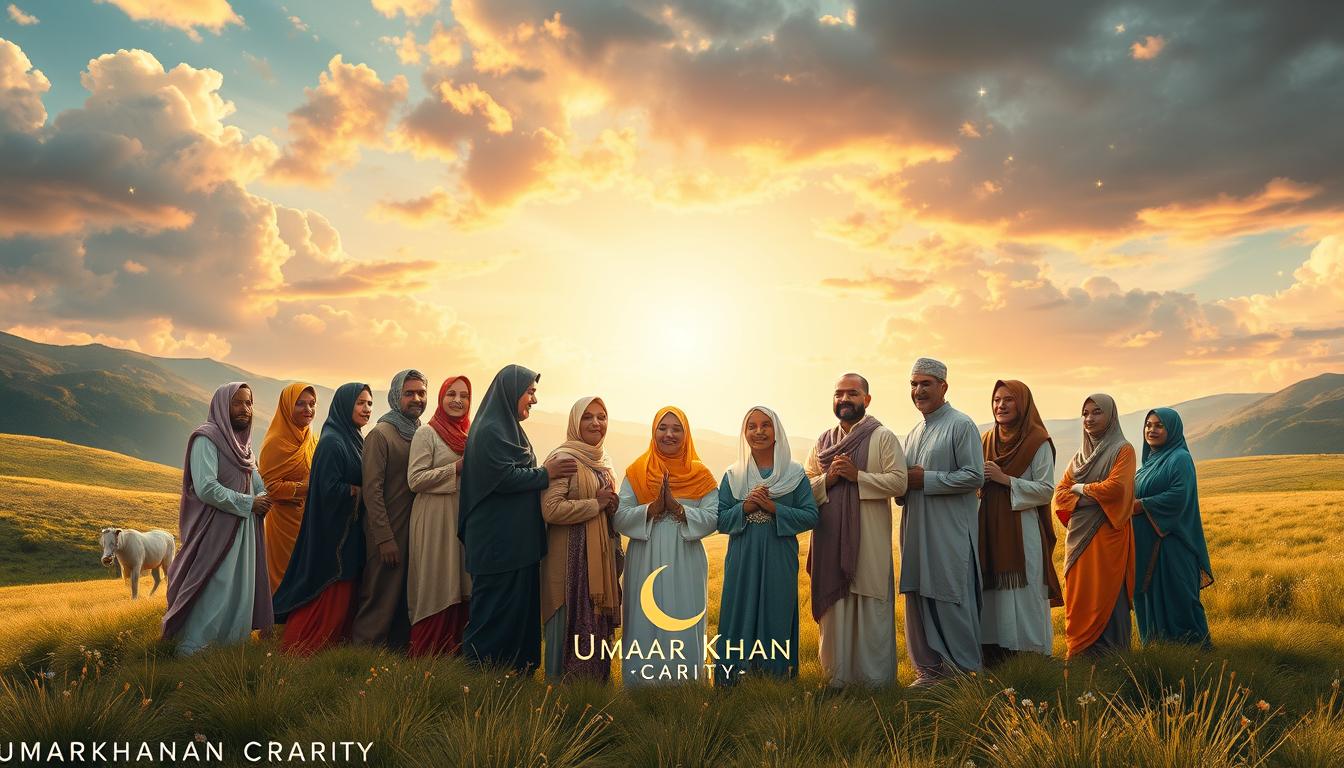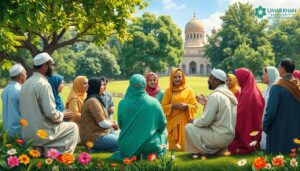Starting a new life as a Muslim can change everything. It’s not just about new beliefs but also new practices and friends. Finding the right support is key to growing and discovering yourself.
At Umar Khan Charity Organization, we help Muslim converts adjust to their new life. We offer guidance and aid, showing how faith and community can change lives. This journey is about embracing a new identity and growing as a person.
Key Takeaways
- Adjusting to a new Muslim identity requires patience, learning, and community support.
- Self-discovery and personal growth are essential aspects of this journey.
- Having the right resources and support can facilitate a smoother transition.
- Umar Khan Charity Organization provides guidance, support, and humanitarian aid to Muslim converts.
- Embracing the process of adjusting to a new Muslim identity can lead to a more fulfilling life.
- Personal growth and self-discovery are critical components of this journey.
- Community support and resources are vital for navigating the challenges of adjusting to a new Muslim identity.
Understanding the Journey of Conversion
The journey of conversion is deeply personal and emotional. It’s about accepting a new identity and all its changes. We must be patient and understanding, knowing it takes time to adjust and learn.
Changing daily life is tough but key to conversion. This means starting new prayer routines, social interactions, and practices. By embracing change, we grow in self-acceptance and move forward.
The Emotional Landscape of Conversion
The emotions during conversion are complex. It’s important to acknowledge feelings like excitement, fear, or uncertainty. This helps us understand ourselves and our place in the world.
Embracing Change in Daily Life
To embrace change in daily life, we must adapt and grow. This includes:
- Starting a regular prayer routine
- Joining new social activities and community events
- Trying out new practices and traditions
These steps help us grow in identity transition and get closer to our true selves.
Building a Support Network
Finding oneself and navigating identity shifts can be tough and lonely. But, with the right community support, we can find the help we need to succeed. At Umar Khan Charity, we know how important a strong support network is for converts. We’re here to provide the resources and connections to help build it.
Community support is key for those finding themselves and going through identity shifts. Connecting with local Muslim communities can give us a sense of belonging. We also get access to resources and knowledge that help us grow in our faith. Mentors who have been through similar experiences offer valuable advice and encouragement.
Some key benefits of community support include:
* Reduced stress and anxiety
* Improved quality of life
* Increased sense of belonging and connection
* Access to resources and knowledge
* Guidance and support from mentors and peers
Building a strong support network helps us overcome the challenges of conversion. At Umar Khan Charity, we’re dedicated to supporting converts. We help them build the connections and resources they need to thrive.
| Benefits of Community Support | Description |
|---|---|
| Reduced stress and anxiety | Community support can help reduce stress and anxiety by providing a sense of belonging and connection. |
| Improved quality of life | Community support can improve quality of life by providing access to resources and knowledge. |
| Increased sense of belonging and connection | Community support can increase sense of belonging and connection by providing opportunities to meet and interact with others. |
Learning About Islamic Practices
As we start our journey of self-discovery and personal growth, learning about Islamic practices is key. Understanding the Five Pillars of Islam and daily rituals like prayer and fasting is vital. It helps us grasp Islam’s role in our lives.
Muslims are diverse, coming from different cultures and languages. This diversity affects how they practice Islam, with culture playing a big part.
Some important Islamic practices include:
- Ritual prayer (salat) as a core aspect of learning Islam
- Reading the Qur’an in Arabic, often in mosques or homes
- Believing in the Qur’an’s literal truth as mainstream Islamic belief
By embracing these practices, we can smoothly navigate our identity transition. This leads to a stronger connection with our faith and community. Through self-discovery and personal growth, we gain a deeper understanding of Islam. This makes our faith journey more meaningful and fulfilling.
| Islamic Principle | Description |
|---|---|
| Five Pillars of Islam | Fundamental practices of Islam, including the declaration of faith, prayer, charity, fasting, and pilgrimage |
| Ritual Prayer (Salat) | Core aspect of learning Islam, performed five times a day |
Spiritual Growth Post-Conversion
Our journey of conversion is filled with spiritual growth. This journey is about embracing change and getting to know ourselves and our faith better. By finding oneself and connecting with Allah, we find peace and accept ourselves.
Our spiritual growth is linked to our prayer and worship habits. These practices strengthen our faith and bond with our community. Key parts of this growth include:
- Establishing a consistent prayer routine
- Engaging in acts of charity and volunteer work
- Seeking knowledge and guidance from Islamic scholars and mentors
By focusing on spiritual growth, we find purpose and meaning in life. This leads to a more fulfilling life as a Muslim.
| Aspect of Spiritual Growth | Importance |
|---|---|
| Regular Prayer | Fosters a sense of connection with Allah |
| Acts of Charity | Encourages compassion and empathy |
| Seeking Knowledge | Deepens understanding of Islamic principles |
Finding Your Identity Within the Community
Finding your identity in the Muslim community is key for personal growth. It’s important to have a strong support system. Community support helps us overcome misconceptions and stereotypes.
Through self-discovery, we find our place as Muslims. We connect with others who share our values. This builds a strong foundation for our spiritual growth.
Some key aspects of finding your identity within the community include:
- Building relationships with fellow Muslims who can offer guidance and support
- Engaging in community activities and events that promote unity and understanding
- Seeking knowledge and wisdom through Islamic education and personal reflection
Navigating identity shifts is a journey that needs patience, empathy, and compassion. By supporting each other, we create a positive environment for growth and self-discovery.
Engaging with Educational Resources
We know how key it is to keep learning and growing. As we go through our identity transition, having good resources is vital. They help us understand Islam better and accept ourselves more.
Books and online courses can offer valuable insights. They help us understand our identity transition and find self-acceptance. For example, learning to navigate social identity in class is key for a welcoming learning space.
Some great resources include:
- Islamic apps for continuous learning
- Online courses on Islamic principles and practices
- Books on Islamic history and culture
Using these resources helps us build a community. It promotes personal growth and self-acceptance for those going through identity transition.
| Resource | Description |
|---|---|
| Islamic apps | Provide access to Islamic knowledge and practices |
| Online courses | Offer in-depth learning on Islamic principles and history |
| Books | Provide insights into Islamic culture and traditions |
Volunteering and Giving Back
We think volunteering and giving back are key parts of our faith. They help a lot with community support and finding oneself. When we help others, we put our faith into action. This makes our communities better and gives us a sense of purpose.
Places like Umar Khan Charity offer chances to help out. Volunteering is a great way to navigate identity shifts and find who we are. It helps us grow as people and feel connected to the world.
- Improved mental and physical health
- Increased sense of purpose and fulfillment
- Enhanced skills and experience
- Broader perspectives and cultural understanding
Volunteering and giving back can change lives for the better. It’s a chance to make a difference in our communities. We invite everyone to join in and help others.
The Transformative Power of Charity
Starting our journey of self-discovery and personal growth, we find that helping others is key. Charity work changes us, as we connect with others and learn more about the world.
Charity is more than just giving. It’s about building relationships and creating a sense of community. When we volunteer, we see the world differently. Our identity changes, and we feel connected to something bigger than ourselves.
Places like Umar Khan Charity offer ways to help. Whether it’s volunteering or donating, every bit counts. Together, we can build a kinder, stronger community.
- Volunteering your time and skills
- Donating resources and funds
- Spreading awareness about the organization’s mission and work
Together, we can make a brighter future. Charity’s power to change us is real.
Maintaining Your New Identity
Embracing a new Muslim identity is a lifelong journey. It needs ongoing effort and support. As you move forward, focus on strategies for long-term integration. Celebrate your milestones, acknowledging your progress and growth.
Continuous learning and community engagement are key. Seek out educational resources and connect with local mosques or Islamic centers. Surround yourself with like-minded people who can guide and encourage you. This will help you feel a sense of belonging and deepen your faith understanding.
The journey of embracing change isn’t always easy. You’ll face challenges and setbacks. But with perseverance and commitment, you’ll overcome them. Take time to reflect on your journey, celebrate your successes, and stay true to your faith.






